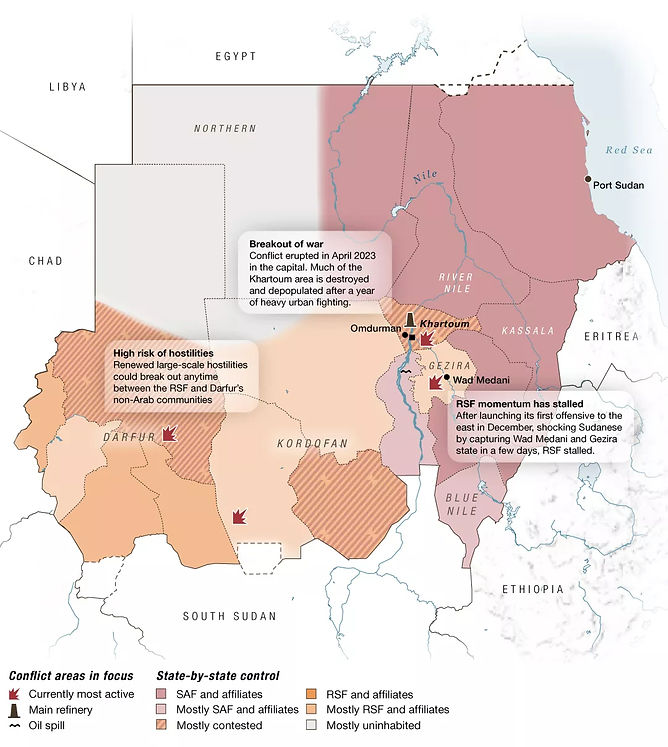SUDAN
Humanitarian and Political Crisis

The Devastating Humanitarian and Political Crisis in Sudan
Sudan is engulfed in one of the world's most severe humanitarian disasters, compounded by a political crisis that has plunged the country into chaos. Since April 2023, violent clashes between the Sudanese Armed Forces (SAF) and the paramilitary Rapid Support Forces (RSF) have escalated into a full-scale civil war, triggering unprecedented suffering for civilians. The conflict, rooted in a power struggle between military factions, has displaced millions, destroyed infrastructure, and left the country on the brink of famine with no resolution in sight.
Collapse of Governance and Escalating Violence
The crisis stems from the breakdown of Sudan's fragile transition to civilian rule following the 2019 ouster of dictator Omar al-Bashir. Tensions between SAF leader General Abdel Fattah al-Burhan and RS commander Mohamed Hamdan Dagalo (Hemedti) erupted into open warfare over control of the state and the integration of the RSF into the national army. The fighting has since spread from Khartoum to Darfur, Kordofan, and other regions, with both sides accused of war crimes, including indiscriminate shelling of civilian areas and blocking humanitarian aid.
A Humanitarian Nightmare
The toll on civilians has been catastrophic:
-
Mass Displacement: Over 10 million people have fled their homes, the largest displacement crisis in the world. Many have sought refuge in overcrowded camps in Chad and South Sudan, where resources are stretched to the limit.
-
Famine Conditions: Nearly 25 million people (half of Sudan's population) now rely on humanitarian aid to survive. The United Nations warns of imminent famine, with 18 million facing acute hunger due to disrupted agriculture and aid blockades.
-
Health System Collapse: 70% of health facilities in conflict zones are non-functional, leaving millions without care amid outbreaks of cholera, malaria, and malnutrition.
-
Ethnic Violence in Darfur: The RS and allied Arab militias have targeted Masalit and other non-Arab communities, repeating the atrocities of the early 2000s genocide. Entire villages have been burned, and thousands massacred.
Failed Diplomacy and International Inaction
Despite multiple ceasefire attempts brokered by the U.S., Saudi Arabia, and regional actors the war continues unabated. The SAF relies on airstrikes and siege tactics, while the RSF wages brutal ground assaults. Foreign powers, including the UAE (backing the RSF) and Egypt (supporting the SAF), have exacerbated the conflict by supplying weapons. Meanwhile, global attention remains minimal compared to other crises, leaving Sudan's people abandoned.
A Race Against Time
Sudan’s crisis is spiraling toward total state failure. Without urgent action, the country risks becoming a permanent humanitarian wasteland. The African States Alliance (ASA) is calling on the international community to enforce an arms embargo, seeking to pressure warring parties to negotiate and scale up life-saving aid. If the world continues to look away, Sudan’s collapse will destabilize the entire region, and history will judge our inaction as complicity in genocide.

After years of war, Sudan’s two main warring parties have divided the country roughly in two, with the RSF controlling most of the west and SAF controlling most of the east. Source: Crisis Group research. Mapcreator, OSM, Copernicus. CRISIS GROUP
